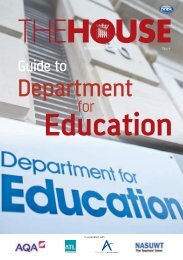Oracy
2fcBkno
2fcBkno
You also want an ePaper? Increase the reach of your titles
YUMPU automatically turns print PDFs into web optimized ePapers that Google loves.
Introduction<br />
There has been a growing recognition in recent years that schools have a special role to play in helping<br />
pupils develop their skills in spoken forms of communication, and in pushing the boundaries of learning<br />
itself through talk. <strong>Oracy</strong>, which encompasses both of these processes, offers a compelling means of<br />
extending pupils’ linguistic, social, emotional and cognitive development. Done well, oracy can permeate<br />
pupils’ lives, both within and beyond the school gates. This has enormous potential for addressing social<br />
disadvantage.<br />
<strong>Oracy</strong> also holds the keys to broader societal benefits. Employers need a workforce capable of<br />
communicating with clarity and sensitivity, and society needs citizens who can engage thoughtfully and<br />
actively in the democratic process. What is more, our families, friends and neighbours need to be able to<br />
talk about how they feel in a manner that encourages discussion, empathy and understanding, not conflict<br />
and division. Perhaps most importantly, we want in ourselves to feel valued and that we have a voice.<br />
Yet there is little research and evidence available relating to how teachers think about and engage with<br />
oracy. This report is a response to that and aims to fill the void. It draws on the results of a survey involving<br />
over 900 teachers and school leaders across the UK, data from 26 interviews and focus groups with<br />
teachers, school leaders and pupils in thirteen schools, and 11 expert interviews.<br />
This report reveals:<br />
1. What teachers think oracy is<br />
2. Whether teachers believe oracy matters and why<br />
3. What teachers and schools are doing to develop oracy<br />
4. The factors that help and hinder oracy in schools<br />
This report is a practical resource for anyone that wants to find out more about oracy and why it matters.<br />
It also sets the scene for Voice 21’s upcoming inquiry into the future of speaking. It is underpinned by the<br />
existing evidence base on oracy (and the many other terms used to describe the processes of learning<br />
to talk well, and learning well through talk), and draws links between what we already know and what<br />
our surveys, interviews and focus groups reveal. Data from interviews and focus groups is used to help<br />
unpick the survey findings, and vignettes exploring what schools are currently doing to support oracy are<br />
interspersed throughout. Combined, these are intended to give teachers and school leaders inspiration<br />
and practical ideas about how oracy could be developed within their settings. They also provide food for<br />
thought for policy and system leaders thinking about ways in which the learning process can be made<br />
more efficient and engaging, help pupils generate deeper learning and understanding, and promote more<br />
cohesive, open and supportive school environments.<br />
8




